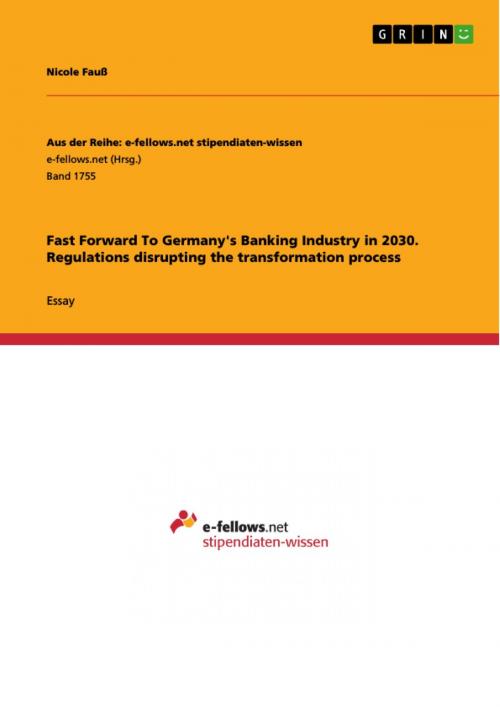Fast Forward To Germany's Banking Industry in 2030. Regulations disrupting the transformation process
Business & Finance, Finance & Investing, Banks & Banking| Author: | Nicole Fauß | ISBN: | 9783668172692 |
| Publisher: | GRIN Verlag | Publication: | March 14, 2016 |
| Imprint: | GRIN Verlag | Language: | English |
| Author: | Nicole Fauß |
| ISBN: | 9783668172692 |
| Publisher: | GRIN Verlag |
| Publication: | March 14, 2016 |
| Imprint: | GRIN Verlag |
| Language: | English |
Essay from the year 2015 in the subject Business economics - Banking, Stock Exchanges, Insurance, Accounting, grade: 100%, University of Technology, Sydney, language: English, abstract: The financial crisis of 2008 stopped the deregulation and expansion phase that dominated from the 1990s onwards in Europe's banking industry. Over the last years significantly changes in the regulatory framework of banking have been made worldwide with the new rules of Basel III, CRD IV, Dodd-Frank and Solvency I to minimize the effect of future crises and protect consumers. Banks worldwide were affected by the increase in regulations, leading to a transformation of the banking industry. Instead of focusing on innovation banks spend large amounts on compliance, reporting and supervisory issues. In 2014 Deutsche Bank, Germans leading bank, spend an additional ?1.3 billion on new regulatory requirements. Therefore, the degree of regulations in the future will decide whether banks can transform their business successfully, being able to add value to customers and compete with new competitors. This essay deals with the transformation process of the German banking industry to 2030. The essay is divided into four main sections. First it will give an overview of the German banking industry. Then it will outline the major trends and driving forces of the transformation process, followed by the critical uncertainties. The fourth part describes four different scenarios of the German banking industry in 2030 according to the two major critical uncertainties that are the degree of regulations and the type of operating model. In my opinion, a high degree of regulations in combination with a universal operating model is most likely to happen. Therefore, this scenario will be described in more depth. In the end, some conclusions will be derived from the previous scenario analysis on how to survive the transformation process.
Essay from the year 2015 in the subject Business economics - Banking, Stock Exchanges, Insurance, Accounting, grade: 100%, University of Technology, Sydney, language: English, abstract: The financial crisis of 2008 stopped the deregulation and expansion phase that dominated from the 1990s onwards in Europe's banking industry. Over the last years significantly changes in the regulatory framework of banking have been made worldwide with the new rules of Basel III, CRD IV, Dodd-Frank and Solvency I to minimize the effect of future crises and protect consumers. Banks worldwide were affected by the increase in regulations, leading to a transformation of the banking industry. Instead of focusing on innovation banks spend large amounts on compliance, reporting and supervisory issues. In 2014 Deutsche Bank, Germans leading bank, spend an additional ?1.3 billion on new regulatory requirements. Therefore, the degree of regulations in the future will decide whether banks can transform their business successfully, being able to add value to customers and compete with new competitors. This essay deals with the transformation process of the German banking industry to 2030. The essay is divided into four main sections. First it will give an overview of the German banking industry. Then it will outline the major trends and driving forces of the transformation process, followed by the critical uncertainties. The fourth part describes four different scenarios of the German banking industry in 2030 according to the two major critical uncertainties that are the degree of regulations and the type of operating model. In my opinion, a high degree of regulations in combination with a universal operating model is most likely to happen. Therefore, this scenario will be described in more depth. In the end, some conclusions will be derived from the previous scenario analysis on how to survive the transformation process.















